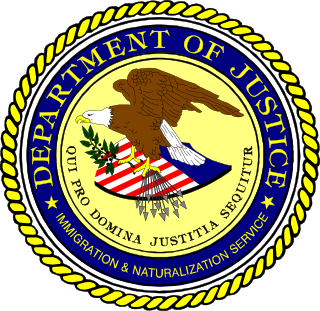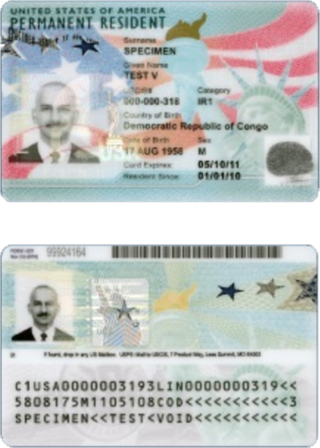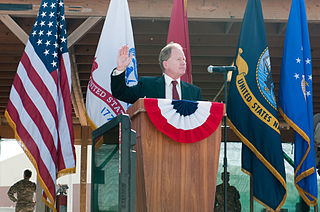
The United States Immigration and Naturalization Service (INS) was an agency of the U.S. Department of Labor from 1933 to 1940 and the U.S. Department of Justice from 1940 to 2003.

A green card, known officially as a permanent resident card, is an identity document which shows that a person has permanent residency in the United States. Green card holders are formally known as lawful permanent residents (LPRs). As of 2019, there are an estimated 13.9 million green card holders, of whom 9.1 million are eligible to become United States citizens. Approximately 65,000 of them serve in the U.S. Armed Forces.

United States nationality law details the conditions in which a person holds United States nationality. In the United States, nationality is typically obtained through provisions in the U.S. Constitution, various laws, and international agreements. Citizenship is a right, not a privilege. While the domestic documents often use citizenship and nationality interchangeably, nationality refers to the legal means in which a person obtains a national identity and formal membership in a nation and citizenship refers to the relationship held by nationals who are also citizens.
In law, an alien is any person who is not a citizen or a national of a specific country, although definitions and terminology differ to some degree depending upon the continent or region. More generally, however, the term "alien" is perceived as synonymous with foreign national.

The Oath of Allegiance of the United States is the official oath of allegiance that must be taken and subscribed by every immigrant who wishes to become a United States citizen.

The politics of Toronto, Toronto, Ontario, Canada involve the election of representatives to the federal, provincial, and municipal levels of government. A total of 25 Members of Parliament (MPs) representing Toronto sit in the House of Commons of Canada in Ottawa, and another 25 Members of Ontario's Provincial Parliament (MPPs) sit in the Legislative Assembly of Ontario at Queen's Park, in Toronto. Being Ontario's capital, many provincial offices are located in the city.
U.S. Citizenship and Immigration Services (USCIS) is an agency of the United States Department of Homeland Security (DHS) that administers the country's naturalization and immigration system. It is a successor to the Immigration and Naturalization Service (INS), which was dissolved by the Homeland Security Act of 2002 and replaced by three components within the DHS: USCIS, Immigration and Customs Enforcement (ICE), and Customs and Border Protection (CBP).
United States citizenship can be acquired by birthright in two situations: by virtue of the person's birth within United States territory or because one or both of their parents is a US citizen. Birthright citizenship contrasts with citizenship acquired in other ways, for example by naturalization.
The Security Through Regularized Immigration and a Vibrant Economy Act of 2007 or STRIVE Act of 2007 is proposed United States legislation designed to address the problem of illegal immigration, introduced into the United States House of Representatives. Its supporters claim it would toughen border security, increase enforcement of and criminal penalties for illegal immigration, and establish an employment verification system to identify illegal aliens working in the United States. It would also establish new programs for both illegal aliens and new immigrant workers to achieve legal citizenship. Critics allege that the bill would turn law enforcement agencies into social welfare agencies as it would not allow CBP to detain illegal immigrants that are eligible for Z-visas and would grant amnesty to millions of illegal aliens with very few restrictions.
Ajay Chattradhari Daby is a barrister and the former Speaker of the Legislative Assembly of Mauritius from 1983 to 1990. He did his secondary schooling at the Royal College of Curepipe. Called to the Bar of England and Wales in 1978, Ajay Daby studied in the United Kingdom and is a member of The Honourable Society of Gray's Inn, London. He is married to Geeta Prayag, a laureate of the Queen Elizabeth College and doctor from the Sheffield University.
During the 18th and most of the 19th centuries, the United States had limited regulation of immigration and naturalization at a national level. Under a mostly prevailing "open border" policy, immigration was generally welcomed, although citizenship was limited to “white persons” as of 1790, and naturalization subject to five year residency requirement as of 1802. Passports and visas were not required for entry to America, rules and procedures for arriving immigrants were determined by local ports of entry or state laws, and processes for naturalization were determined by local county courts.

Citizenship of the United States is a legal status that entails Americans with specific rights, duties, protections, and benefits in the United States. It serves as a foundation of fundamental rights derived from and protected by the Constitution and laws of the United States, such as freedom of expression, due process, the rights to vote, live and work in the United States, and to receive federal assistance.
EB-2 is an immigrant visa preference category for United States employment-based permanent residency, created by the Immigration Act of 1990. The category includes "members of the professions holding advanced degrees or their equivalent", and "individuals who because of their exceptional ability in the sciences, arts, or business will substantially benefit prospectively the national economy, cultural or educational interests, or welfare of the United States, and whose services in the sciences, arts, professions, or business are sought by an employer in the United States". Applicants must generally have an approved labor certification, a job offer, and their employer must have filed an Immigrant Petition for Alien Worker with the USCIS.
Wilderness first aid as an established medical discipline is a relatively new phenomenon compared to the more established field of prehospital emergency medicine. While instructional guidelines for curriculum for prehospital emergency medical care have been standardized by the U.S. federal government, there are no current federal regulations defining scopes of practice for varying levels of wilderness medicine.
The United States policy regarding same-sex immigration denied couples in same-sex relationships the same rights and privileges afforded different-sex couples based on several court decisions and the Defense of Marriage Act (DOMA) until the U.S. Supreme Court ruled Section 3 of DOMA unconstitutional in United States v. Windsor on June 26, 2013.

The Renunciation Act of 1944 was an act of the 78th Congress regarding the renunciation of United States citizenship. Prior to the law's passage, it was not possible to lose U.S. citizenship while in U.S. territory except by conviction for treason; the Renunciation Act allowed people physically present in the U.S. to renounce citizenship when the country was in a state of war by making an application to the Attorney General. The intention of the 1944 Act was to encourage Japanese American internees to renounce citizenship so that they could be deported to Japan.
Roller Derby Madrid (RDM) is a flat-track roller derby league based in Madrid, Spain and founded in 2012. The league plays by the rule set of the Women's Flat Track Derby Association (WFTDA).

The American Civics Test is an oral examination that is administered to immigrants who are applying for U.S. citizenship. The test is designed to assess the applicants' knowledge of U.S. history and government. US Citizenship and Immigration Services (USCIS) administers the test as part of the naturalization process.
The United States Citizenship and Immigration Services (USCIS) issues a number of forms for people to submit to them relating to immigrant and non-immigrant visa statuses. These forms begin with the letter "I". None of the forms directly grants a United States visa, but approval of these forms may provide authorization for staying or extending one's stay in the United States as well as authorization for work. Some United States visas require an associated approved USCIS immigration form to be submitted as part of the application.

Systematic Alien Verification for Entitlements (SAVE) is a program managed by United States Citizenship and Immigration Services (USCIS), a branch of the U.S. Department of Homeland Security (DHS). SAVE facilitates lookups on the immigration and nationality status of individuals in the United States. It is an intergovernmental initiative designed to help federal, state, tribal, and local government agencies, or by a contractor acting on the agency's behalf, to determine eligibility for benefits, licenses or grants, government credentials, or to conduct background investigations. It is one of two programs that uses the Verification Information System (VIS). The other program is the Electronic Employment Eligibility Verification Program, also known as E-Verify, and is used by employers to verify the immigration status of employees. For additional verification, SAVE relies on the Person Centric Query System (PCQS).









